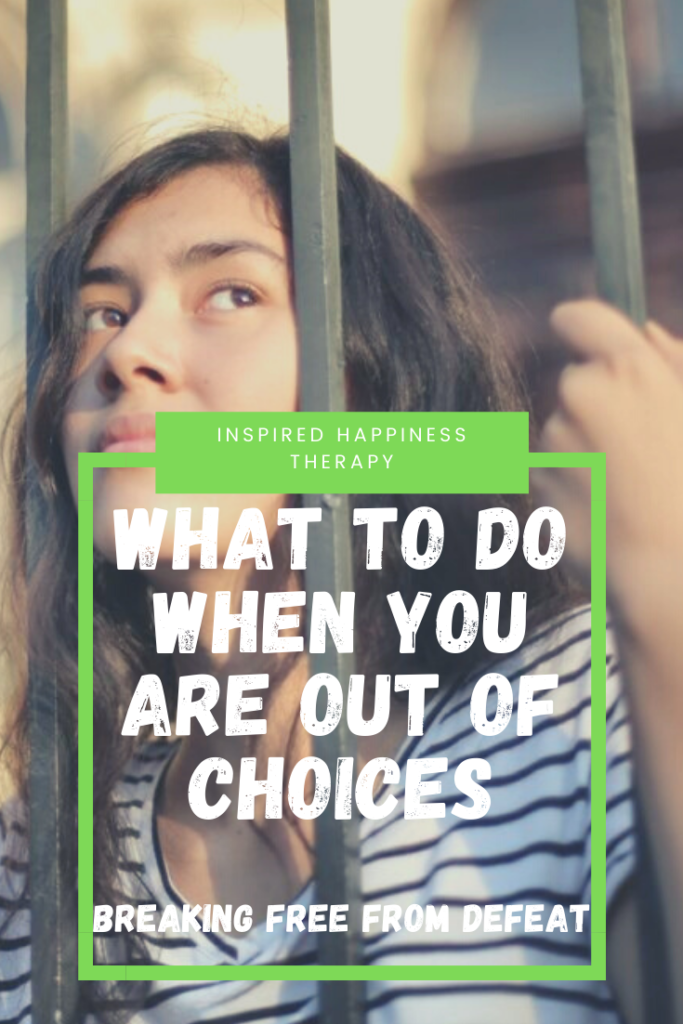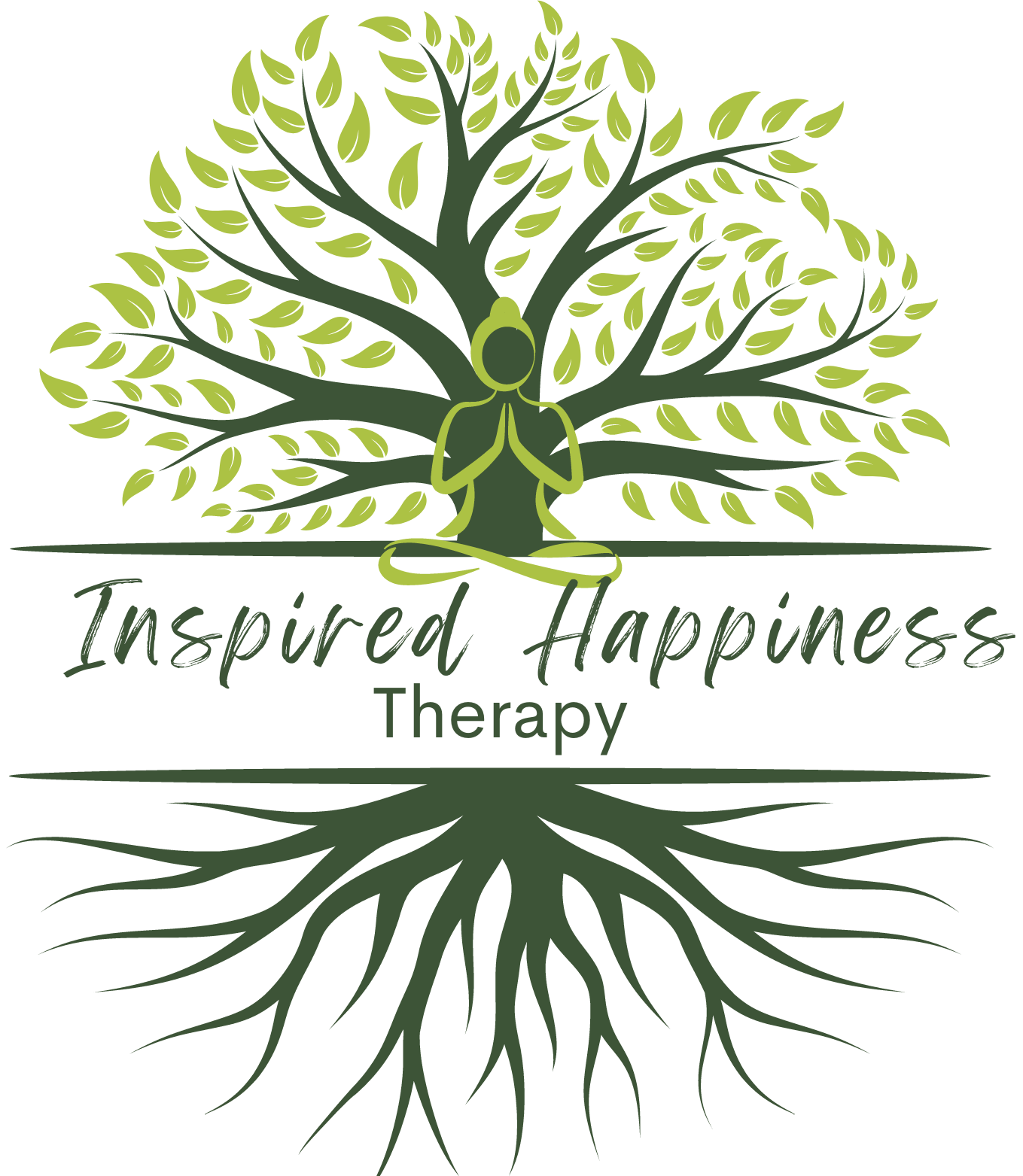
Here Is What To Do
When You Are Out Of Choices
A woman in her mid-60s sits in front of me. “I don’t have any choices.” She tells me. “There is nothing I can do. I guess I will just have to be miserable.”
She had just finished telling me that her husband was refusing to budge. He had made a decision without her input, he did not care that she disagreed, he was following through with his decision. There was no compromising because he refused to compromise or to change.
From my seat, I could see that she had many choices in this situation, there were just no good choices. There was not an easy choice, a choice that would allow her to avoid conflict, so instead she chose defeat. She did not, perhaps could not, see that by not choosing, she was still making a choice!
“You do have a choice,” I told her. “Several choices in fact.”
“I don’t!” She exclaimed, taken aback at the idea. “There is no way to get him to do what I want.”
“That is true.” I admitted, “but that’s not the same as not having any choices.”
“A gentleman was walking through an elephant camp, and he spotted that the elephants weren’t being kept in cages or held by the use of chains. All that was holding them back from escaping the camp, was a small piece of rope tied to one of their legs.
As the man gazed upon the elephants, he was completely confused as to why the elephants didn’t just use their strength to break the rope and escape the camp. They could easily have done so, but instead, they didn’t try to at all. Curious and wanting to know the answer, he asked a trainer nearby why the elephants were just standing there and never tried to escape.
The trainer replied; ‘When they are very young and much smaller we use the same size rope to tie them and, at that age, it’s enough to hold them. As they grow up, they are conditioned to believe they cannot break away. They believe the rope can still hold them, so they never try to break free.’”
– My Positive Voice
Everything Is A Choice
Can you see some of the potential choices that she had? Let’s break it down.
She could continue to push the issue. Instead of backing down and accepting that her husband was also not backing down, she could insist that they continue discussing it until a compromised could be reached. This might mean having a disagreement or a fight, which she wanted to avoid. By choosing not to push the issue in order to avoid a fight, she was making a choice.
If her husband remained steadfast in refusing to discuss or entertain her opinion, she had other choices. She could choose to leave him. It’s an extreme choice but it is still a choice. They might have a trial separation while she made it clear that she was not willing to be in a relationship with a person who refused to take her feelings and opinions seriously. Perhaps they could work through it, perhaps not, but that particular choice was not hers.
In the event that her husband refused to the very end to care about her thoughts and feelings, she might have to make the choice to either continue to be married to someone who doesn’t care about her thoughts and feelings or to divorce. While she may not like those choices, they are still choices. Leaving is a choice but staying is a choice as well. Taking the path of least resistance is still a choice. Staying in a relationship with someone would act unilaterally regardless of her feelings is not a healthy choice, but it is still a choice.

- First break down the choices.
- Remember not choosing is still a choice.
- Even if there are no good choices or no choices you like, continue to call them choices.
- No matter what happens, you always have a choice. Even if there are only bad choices, you still have a choice.
We Learn To Give
Our Agency Away
Of course in the situation above, this was not the first time that my client had been made to feel powerless. She had been married to him for many years and their relationship had never been one where opinions and feelings mattered equally. He made the big decisions and she just went along with them. She had spent many years feeling angry and depressed because he had decided to move the family to a place she did not want to live.
By the time this situation arose, she already felt defeated. She knew that arguing with him would do no good. He would give her the cold shoulder, ice her out, stop speaking to her. Eventually she would hurt so much that she would give in but this led to a depression she had never solved. She had tried anti-depressants but they never helped or only helped until the next time her spouse showed her that she didn’t matter.
Her spouse was not the first person who had told her by words or by actions, that she did not matter. She grew up in a household that left her primed for an authoritarian relationship that she did not recognize was abusive because it was not physically abusive. The years of “having no choice” were just a continuation of never having a voice as a child.
By viewing unhealthy choices as choices, it helped to empower her. I refused to allow her to continue believing she had no choices. She might decide to stay in a marriage where she did not matter, but while choosing to do so was unhealthy, viewing it as a choice helped to chip away at her learned helplessness. Like the elephant in the story above, she had already learned in small ways that she had no choice so she was unable to make bigger choices. Every time her husband made a decision and refused to discuss it with her or knew she disagreed but would not consider compromise, he reinforced that she did not matter. She stopped seeing that she allowed him to treat her this way and started saying “I have no choice.”

You Do Not Have To Stay In Exploitative Situations
Another client had a boss that was demeaning, not just to her but to most of her coworkers as well. The work environment was negative and toxic. She started feeling anxious and depressed on her way to work and then as more time passed she felt anxious and depressed even when she was not at work. It was not a situation where her boss was breaking any laws, he did not sexually harass people or commit any crimes. However he had unrealistically high standards and would frequently verbally abuse his employees. Whomever he was happy with would get special treatment and the others would compete with one another trying to get his favor.
This client wanted to find ways to cope with his behavior but she was a very emotionally sensitive person and there was no way to not care about the environment she worked in.
“I need my job.” She moaned. “I can’t just quit because my boss is mean.”
She saw quitting as an absolute last resort. She believed that she should be “strong enough” to endure a demoralizing environment for 40+ hours per week and not be effected by it.
There are few fields where changing jobs is not an option. This client had to overcome the idea that she needed to “get a thicker skin” an idea that was not new to her because that’s also how her parents gaslit her when she was growing up. She considered her reactions to verbal and psychological abuse to be the problem rather than seeing the problem for what it was: someone verbally and psychologically abusing her and those around her.
Codependency and Learned Helplessness
For people who grew up in alcoholic or abusive households, codependency is also common. There are times when we feel we have no choices because we are attempting to protect other people from their behavior. This is also known as enabling. Here is an example of an overlap between feeling you have no choices and enabling.
A client who was a recovering alcoholic had two adult children, one of whom was actively misusing alcohol. He blamed her and “his bad childhood” for his drinking and refused to take responsibility for things like losing a job because he never showed up to work. Nothing was ever his fault, it was all because of how she had failed him. Consumed with guilt, she bailed him out of every situation he found himself in. Because he never had to face the consequences of his actions and choices, he continued to be irresponsible, knowing mom will always fix it.
The latest situation was due to his drinking and not going to work. He had found another new job but was short on his rent.
Our conversation went something like this:
“If I don’t give him $200 he will end up on the street. I don’t have a choice!” His mother told me.
“Why is he short on money?” I asked her.
“He keeps losing jobs! He never shows up. I told him I will pay for him to go to rehab but he just refuses to go.” She shook her head, replaying their conversation in her head.

“Then you do have a choice.” I told her, “You can tell him he can take the assistance you have offered [rehab] or leave it but that is what you are willing to offer.”
“But if I don’t help him he will be homeless!”
“He made the choice to not go to work. He made the choice to spend money on alcohol instead of bills.” I reminded her. “You can choose whether or not you want to continue enabling him.”
In the end, the client’s son did not end up homeless. Most of the time people figure something out and if they don’t, the consequences of their bad choices will teach them not to do the same thing again next time. Enabling was not helping my client’s son any more than it was helping her. While she made the choice to not give him any money, she could have chosen to continue enabling him, just acknowledging that she was making that choice.
Unlearning Learned Helplessness
If you have trouble making choices that are healthy for you, often the first step is just acknowledging that your unhealthy choices are still choices. It is a lot more difficult to continue making unhealthy choices if you admit you are actively choosing the unhealthy choice.
Making the choice to stop enabling; leaving a domineering spouse; or quitting a job that makes you miserable are all tough choices to make.
If they were easy choices, it would not feel like you had no choice at all! Learned helplessness was first and foremost LEARNED meaning that you have to unlearn it. In most cases, people don’t even know they are struggling with learned helplessness.
By viewing everything as a choice, you begin to give yourself back the agency that you have been giving away. It’s always been yours! Just like the elephant, all you have to do is take back your power, break the rope, and start deciding for yourself what you will and will not accept.

Like this post?
If you found this post helpful, use the links below to share it on social media! This helps other people find the blog.


Stacey Aldridge, LCSW
Stacey is a therapist in private practice and the owner of Inspired Happiness Therapy and Wellness in Ridgeland, MS. If you are in the state of Mississippi and are interested in seeing Stacey for therapy, please visit the Appointments page.

